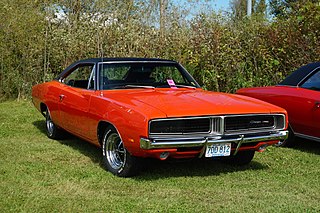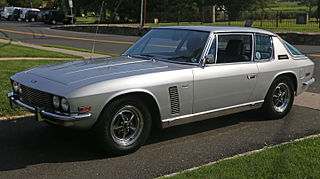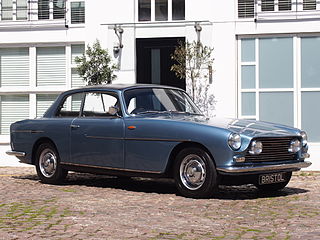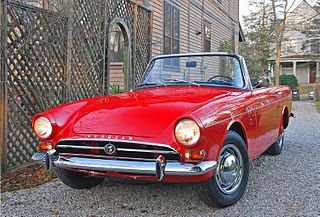
Bristol Cars was a British manufacturer of hand-built luxury cars headquartered in Bristol, England. It was formed from the car division of the Bristol Aeroplane Company after the Second World War and later became independent as Bristol Cars Limited. After being placed in receivership and being taken over in 2011, it entered liquidation in February 2020.

The Plymouth Road Runner is a mid-size car with a focus on performance built by Plymouth in the United States between 1968 and 1980. By 1968, some of the original muscle cars were moving away from their roots as relatively cheap, fast cars as they gained features and increased in price. Plymouth developed the Road Runner to market a lower-priced, basic trim model to its upscale GTX.

The Chrysler 300 "letter series" are high-performance personal luxury cars that were built by Chrysler in the U.S. from 1955 to 1965 and were a sub-model from the Chrysler New Yorker. After the initial year, which was named C-300 for its standard 300 hp (220 kW) 331 cu in (5.4 L) FirePower V8, the 1956 cars were designated 300B. Successive model years were given the next letter of the alphabet as a suffix, reaching the 300L by 1965, after which the model sequence was discontinued while the "300" remained. At its introduction it was advertised as "America's Most Powerful Car".

The Chrysler New Yorker is an automobile model produced by Chrysler from 1940 until 1996, serving for several decades as either the brand's flagship model or as a junior sedan to the Chrysler Imperial, the latter during the years in which the Imperial name was used within the Chrysler lineup rather than as a standalone brand.

The Dodge Charger is a model of automobile marketed by Dodge in various forms over eight generations since 1966.

The Chrysler A engine is an OHV small-block V8 gasoline engine built by Chrysler from 1956 until 1967. It featured polyspherical combustion chambers, and was offered in displacements from 276.1 cu in (4.5 L) to 325.2 cu in (5.3 L), and in various high-power configurations. It began to be replaced by the wedge-head LA engine in 1964, and is not related to the hemispherical-head Hemi engine of the 1950s or 1960s.

The Chrysler Valiant was a full-size car which was sold by Chrysler Australia between 1962 and 1981. Initially a rebadged locally assembled Plymouth Valiant from the United States, from the second generation launched in 1963, the Valiant was fully manufactured in Australia. It was sold locally but also in New Zealand and South Africa, with smaller numbers also exported to South-East Asia and the United Kingdom.

The Jensen Interceptor is a grand touring car which was hand-built at the Kelvin Way Factory in West Bromwich, near Birmingham in England, by Jensen Motors between 1966 and 1976. The Interceptor name had been used previously by Jensen for the Jensen Interceptor made between 1950 and 1957 at the Carters Green factory. Jensen had extensively used glass-reinforced plastic for the fabrication of body panels in the preceding two decades, but the new Interceptor was a return to a steel body-shell. The body was designed by an outside firm, Carrozzeria Touring of Italy, rather than the in-house staff. The early bodies were built in Italy by Vignale, before Jensen took production in house, making some subtle body modifications.

The MGB is a two-door sports car manufactured and marketed from 1962 until 1980 by the British Motor Corporation (BMC), later the Austin-Morris division of British Leyland, as a four-cylinder, soft-top sports car. It was announced and its details first published on 19 September 1962. Variants include the MGB GT three-door 2+2 coupé (1965–1980), the six-cylinder sports car and coupé MGC (1967–1969), and the eight-cylinder 2+2 coupé, the MGB GT V8 (1973–1976).

TorqueFlite is the trademarked name of Chrysler Corporation's automatic transmissions, starting with the three-speed unit introduced late in the 1956 model year as a successor to Chrysler's two-speed PowerFlite. In the 1990s, the TorqueFlite name was dropped in favor of alphanumeric designations, although the latest Chrysler eight-speed automatic transmission has revived the name.

PowerFlite is a two-speed automatic transmission engineered and produced by the Chrysler Corporation and used in their passenger cars from 1954 to 1961. Production began in late 1953 and the simple and durable PowerFlite remained available on Plymouths and Dodges through the 1961 model year.

The Chrysler Town & Country is an automobile which was manufactured by Chrysler from 1940 to 1942 and from 1945 to 1988 with production interrupted during World War II. Primarily produced as a luxury station wagon, the Town & Country was also available in "woodie" four-door sedan, two-door hardtop and convertible body styles from 1947 to 1950, 1968 to 1969 and from 1983 to 1986. The 1988 model year was the last for the station wagon until the 1990 model year when Chrysler reintroduced the Town & Country nameplate as the rebadged variant Chrysler Town & Country minivan.

The Moskvitch-408 series is a small family car produced by the Soviet car manufacturer MZMA/AZLK between 1964 and 1975. The first prototype was made in 1960.

The Bristol 408 is a British luxury car made by Bristol Cars between 1963 and 1966. Unusually for Bristol, a slightly revised version was launched during the middle of the model's production run in 1965 and known as the 408 Mark II.

The Bristol 411 is an automobile which was built by the British manufacturer Bristol Cars from 1969 to 1976. It was the fifth series of Chrysler-V8 engined Bristol models. The car was rated highly for its comfort, performance and handling by contemporary reviewers.

The Hillman Super Minx is a family car which was produced by Hillman from 1961 to 1967. It was a slightly larger version of the Hillman Minx, from the period when the long-running Minx nameplate was applied to the "Audax" series of designs.

The Chrysler VIP is an automobile which was produced by Chrysler Australia from 1969 to 1971. It is an extended wheelbase, luxury variant of the Australian developed Chrysler Valiant.

The Chrysler VC Valiant is an automobile that was produced in Australia by Chrysler Australia from 1966 to 1967. It was released in March 1966, replacing the Chrysler AP6 Valiant. The VC was the fifth Chrysler Valiant model to be produced in Australia.

The Sunbeam Tiger is a high-performance V8 version of the British Rootes Group's Sunbeam Alpine roadster, designed in part by American car designer and racing driver Carroll Shelby and produced from 1964 until 1967. Shelby had carried out a similar V8 conversion on the AC Cobra, and hoped to be offered the contract to produce the Tiger at his facility in the United States. Rootes decided instead to contract the assembly work to Jensen at West Bromwich in England, and pay Shelby a royalty on every car produced.

The Chrysler Valiant AP6 is an automobile which was produced by Chrysler Australia from 1965 to 1966. It was the fourth Chrysler Valiant model produced in Australia.




















